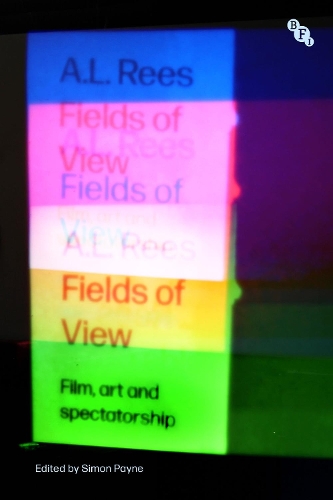
Fields of View: Film, Art and Spectatorship
(Paperback)
Publishing Details
Fields of View: Film, Art and Spectatorship
By (Author) A.L. Rees
Volume editor Simon Payne
Bloomsbury Publishing PLC
BFI Publishing
29th October 2020
United Kingdom
Classifications
Tertiary Education
Non Fiction
Film history, theory or criticism
Digital, video and new media arts
791.43611
Physical Properties
Paperback
240
Width 152mm, Height 232mm, Spine 12mm
440g
Description
Drawing on film theory, literary modernism, psychology and art history, Fields of View elucidates an expanded network of connections between avant-garde film and wider culture. In this bold and original work, A.L. Rees identifies three key terms - field, frame and interval and charts their use by filmmakers and theorists such as Dziga Vertov, Sergei Eisenstein, Bruce Baillie, Maya Deren, Malcolm Le Grice and Werner Nekes, from the 1920s through to the present day. A seminal voice in film culture, Rees left the incomplete manuscript for this book on his death, and Simon Payne has subsequently carefully prepared the book for publication. Fields of View is an important work that establishes a unique perspective on experimental film.
Reviews
Al Rees's testament is a cinematic thinking: film and world swooping towards each other across a landscape of fields and intervals, projections and geometries, movements in and of time and space. On every page, the generosity of the man, the curator and the teacher shape new insights into our audiovisual century and its lineage. A work of permanent illumination. -- Sean Cubitt, Professor of Screen Studies, University of Melbourne, Australia
In the unlikely event that there was any doubt, Fields of View affirms A.L. Rees as one of experimental cinemas most erudite, insightful, and passionate critics and advocates. His writings, which range across a breathtaking array of subjects, ideas, works, and references, are intelligent - frequently brilliant - without ever devoting into intellectualism. They are astonishingly well-read without succumbing to mere scholasticism; we never lose the sense of an original voice, a distinct sensibility, and a great mind. Like all the best critical writing, Reess is itself elegant, artful, provocative, and personal. This collection of essays is an excellent introduction for those unfamiliar with Rees, and a reminder to those of us who already knew his writing how important he was (and remains), and what great writing about art looks like. -- Dr Jonathan Walley, Associate Professor, Department of Cinema, Denison University, USA
In this posthumous collection of essays, A.L. Rees has woven his outstanding knowledge of avant-garde film into a startlingly original, and non-linear, reconfiguration of its history. With great agility and lightness of touch, his perceptive but unexpected juxtapositions between theorists and artists, ideas and technologies, movements and moments throw new light on key issues of film theory and aesthetics. This radical rejection of chronology, however, has an underlying message. Rees traces ways in which experimental art and artists film have challenged traditions of space and time that, rather than abrupt rupture, create a direct connection with the forms of digital art. In the brilliant last chapters of the book, he zeroes in on this dialectic. -- Laura Mulvey, Professor of Film and Media Studies at Birkbeck, University of London, UK.
Author Bio
A.L. Rees was Head of the Time Based Media course at Maidstone College of Art from 1988 1995 and then Research Tutor at the Royal College of Art until 2014. At various times he was the chair of the Arts Councils artists film and video committee, and an adviser on experimental film to the British Film Institute, Tate, the Arts and Humanities Research Council and Channel 4. His book A History of Experimental Film and Video (BFI, 1999/2011) remains a key text, supplemented by the wide range of essays he wrote for journals and books on film and art. Simon Payne is Reader in Film and Media Studies at Anglia Ruskin University,UK. In addition, he is an experimental video maker whose work has shown in numerous venues including Tate Modern; the Serpentine Gallery; The Hermitage, St Petersburg and the London, Edinburgh and Rotterdam Film Festivals. He has written widely on experimental film and video, and recently co-edited Kurt Kren: Structural Film with Nicky Hamlyn and A.L. Rees.
